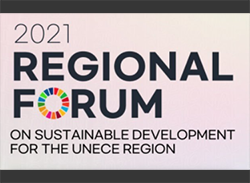About partnerships
WHO/Europe is committed to strengthening its collaboration with existing partners, approaching new ones and making sure that agreements are implemented effectively.
Read more about PartnershipsTop story
 WHO and UNDP host joint session on intersectoral responses to COVID-19
WHO and UNDP host joint session on intersectoral responses to COVID-19
Over 100 participants joined a peer-learning round table centred on the impact of COVID-19 on people’s lives, and strengthening health systems and social protection, as part of the United Nations Economic Commission for Europe (UNECE) 2021 Regional Forum on Sustainable Development.
European Union
The EU is an increasingly important actor in global health and international affairs, and a strong supporter of WHO’s role as the lead agency for health, both globally and in the region.
Read moreEuropean Observatory on Health Systems and Policies
The European Observatory on Health Systems and Policies supports and promotes evidence-based health policy-making through comprehensive and rigorous analysis of the dynamics of health care systems in Europe.
Read moreUnited Nations system
As the UN specialized agency for health, WHO collaborates with other United Nations (UN) organizations, agencies and funds, to ensure effective coordination, synergy and policy coherence for working in health or health-related areas
Read moreGlobal Health Partnerships
Global health partnerships involve governments, civil society, international organizations, the private sector and affected communities under an umbrella framework.
Read moreRegional Organizations
WHO/Europe works with several of these networks. It seeks the added value and comparative advantage of each network it decides to join, hence avoiding duplication of work in Member States.
Read moreOECD
OECD and WHO have a long-standing relationship that focuses on issues of improving the collection, harmonization and dissemination of health data and indicators, issues in health systems and environment and health, and noncommunicable diseases.
Read moreNon-State actors
WHO’s engagement with non-State actors can bring important benefits to global public health and to the work of the Organization in fulfilling its directing and coordinating role in global health.
Read more




